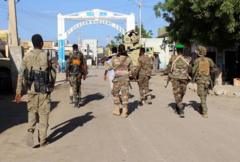As the diplomatic landscape between the US and Iran grows increasingly tenuous, discussions surrounding nuclear capabilities remain mired in contention. US President Donald Trump has reiterated his commitment to confronting Iran's nuclear ambitions, invoking both economic and military pressure.
**Impending Nuclear Discussions: The US and Iran Remain at an Impasse**

**Impending Nuclear Discussions: The US and Iran Remain at an Impasse**
Negotiations between the US and Iran show minimal signs of progress as both parties prepare for critical talks this weekend.
In the wake of his 2018 withdrawal from the Joint Comprehensive Plan of Action (JCPOA), Trump reinstituted sanctions against Iran, leading to a substantial increase in uranium enrichment within Iranian borders. Despite the ongoing challenges, Iranian policymakers display a mixed willingness to engage, contingent upon potential economic reprieve from crippling sanctions.
With the US demanding extensive concessions — including dismantlement of Iran's nuclear program and cessation of support for militant groups — the chasm between the two nations shows little promise of narrowing. Meanwhile, Israel continues to advocate strongly for complete eradication of any nuclear capabilities possessed by Iran, underscoring the regional tensions inherent in the negotiating process.
As the talks loom closer, the stakes are higher than ever before. A failure to reach agreement could signal dire consequences, adding another layer of complexity to an already volatile geopolitical situation.
The unfolding drama also highlights the inherent risks of hurried diplomacy; a measured approach may have been more prudent given the history of prolonged negotiations. The global community watches closely as this delicate situation develops, hoping for stability in a region fraught with uncertainties.
The future of nuclear negotiations between the US and Iran stands as a pivotal narrative in global diplomacy, capturing the attention of not just the nations involved but also the international community as a whole.
With the US demanding extensive concessions — including dismantlement of Iran's nuclear program and cessation of support for militant groups — the chasm between the two nations shows little promise of narrowing. Meanwhile, Israel continues to advocate strongly for complete eradication of any nuclear capabilities possessed by Iran, underscoring the regional tensions inherent in the negotiating process.
As the talks loom closer, the stakes are higher than ever before. A failure to reach agreement could signal dire consequences, adding another layer of complexity to an already volatile geopolitical situation.
The unfolding drama also highlights the inherent risks of hurried diplomacy; a measured approach may have been more prudent given the history of prolonged negotiations. The global community watches closely as this delicate situation develops, hoping for stability in a region fraught with uncertainties.
The future of nuclear negotiations between the US and Iran stands as a pivotal narrative in global diplomacy, capturing the attention of not just the nations involved but also the international community as a whole.





















